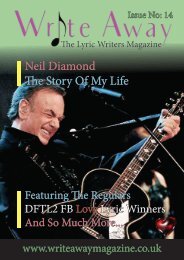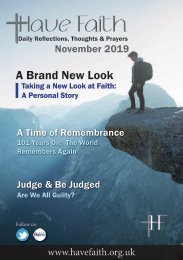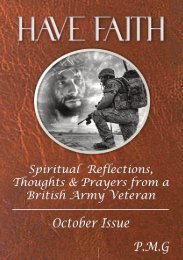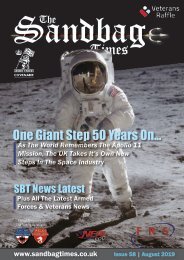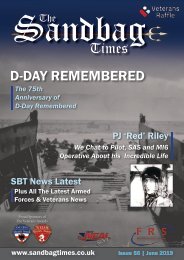Write Away Magazine - Issue No:13
The Lyric Writers Magazine
The Lyric Writers Magazine
- No tags were found...
You also want an ePaper? Increase the reach of your titles
YUMPU automatically turns print PDFs into web optimized ePapers that Google loves.
Karen Carpenter<br />
It’s no secret that the 60’s and 70’s was an oasis of incredible<br />
musicians on the popular music front. The variety of skill<br />
and talent was simply mindblowing.<br />
Quite a generic start for an article I admit but when talking<br />
about Karen Carpenter, you have to use words like ‘incredible’<br />
and ‘mindblowing’. It’s funny though, to the casual music<br />
listener, very few would accredit Karen Carpenter as a<br />
drummer. Many wouldn’t know that she actually started her<br />
music career this way, not singing until some time later. In fact<br />
she often described herself as a drummer who could sing.<br />
By the time of her death in 1983, she had one of the most<br />
unique voices in popular music. Of course, it was truly<br />
beautiful but it had a power which could reach right into the<br />
soul of any mere mortal without the hint of effort. So we begin<br />
our story of Karen Carpenter...<br />
Karen was born in 1950 in New Haven, Conneticut, the<br />
youngest of two children. Her brother, Richard was older by<br />
three years and would later become the other half of the duo,<br />
The Carpenters.<br />
During Karen’s younger years, she loved dancing and by the<br />
age of four was already involved in Tap and Ballet classes.<br />
Her brother was already learning piano and becoming a very<br />
talented musician.<br />
In 1963 the family moved to Los Angeles and a year later, at<br />
the age of 14, Karen joined her school band. To begin with she<br />
was given the Glockenspiel, an instrument she was not very<br />
fond of but soon found herself drawn to the drums. Her family<br />
bought her a drum set and within a year she was playing very<br />
complicated and skilled drum signatures.<br />
Carpenter was initially nervous about performing in public,<br />
but said she “was too involved in the music to worry about it”.<br />
She graduated from Downey High School in the spring of 1967,<br />
receiving the John Philip Sousa Band Award, and enrolled as a<br />
music major at Long Beach State where she performed in the<br />
college choir with Richard. The choir’s director, Frank Pooler,<br />
said that Karen had a good voice that was particularly suited to<br />
pop, and gave her lessons in order for her to develop a threeoctave<br />
range.<br />
In 1965, Karen, Richard, and his college friend Wes Jacobs, a<br />
bassist and tuba player, formed the Richard Carpenter Trio.[16]<br />
The band rehearsed daily, played jazz in nightclubs, and also<br />
appeared on the TV talent show Your All-American College<br />
Show.[8] Richard was immediately impressed with his sister’s<br />
musical talent, saying she would “speedily maneuver the sticks<br />
as if she had been born in a drum factory”.[17] She did not sing<br />
at this point; instead, singer Margaret Shanor guested on some<br />
of their songs.<br />
After Jacobs left the band in 1967, Richard and Karen were<br />
keen to try out other music styles and with Gary Sims and John<br />
Bettis they formed the band Spectrum. However, this was not<br />
to prove successful.<br />
In 1969, A&M Records signed the Carpenters and the first<br />
album, The Offering (later retitled Ticket to Ride) was written.<br />
10 of the <strong>13</strong> songs were written by Richard with Karen singing<br />
most of the songs as well as playing drums and bass.<br />
Their next album ‘Close to You was to provide the Carpenters<br />
with two hit singles, (They long to be) Close to you and We’ve<br />
only just begun reaching <strong>No</strong>:1 and <strong>No</strong>:2 in the charts.<br />
During the mid 1970’s both were plagued by health issues.<br />
Richard had drug addiction problems while Karen was battling<br />
with weight loss and Anorexia. The result was many cancelled<br />
gigs and tours.<br />
In 1979, while Richard was taking a year off for addiction<br />
treatments, Karen decided to record a solo album. Many of the<br />
recordings on the album were shelved but later released after<br />
her death.<br />
Karen’s personal life had become turbulent, not finding stable<br />
romance until 1980 when after a whirlwind relationship, she<br />
married Thomas Burris. This would also prove to be ill-fated<br />
and 14 months later the couple split.<br />
Her ongoing illness with her weight was also becoming very<br />
apparent at public appearances as she was looking more<br />
and more frail. Karen was frequently in and out of hospital<br />
undergoing treatments for Anorexia and her addiction to<br />
laxitives.<br />
On 4th February 1983, Karen collapsed at her parents home.<br />
Paramedics were called and found her heart beating just once<br />
every ten seconds. She was rushed to Downey Community<br />
Hospital but was pronounced dead at 9:51am.<br />
Carpenter’s funeral was held February 8, 1983, at Downey<br />
United Methodist Church. Approximately one thousand<br />
mourners attended, including her friends Dorothy Hamill,<br />
Olivia Newton-John, Petula Clark and Dionne Warwick. Her<br />
estranged husband Thomas Burris also attended, and tossed his<br />
wedding ring into her casket. Carpenter was buried at the Forest<br />
Lawn Memorial Park in Cypress, California. In 2003 her body<br />
was moved, to be placed with her parents in a mausoleum at the<br />
Pierce Brothers Valley Oaks Memorial Park in Westlake Village,<br />
California.<br />
An autopsy released on March 11, 1983, ruled out drug<br />
overdose, attributing death to “emetine cardiotoxicity due to<br />
or as a consequence of anorexia nervosa”. She was discovered<br />
to have a blood sugar level of 1,110 milligrams per decilitre,<br />
more than ten times the average. Two years later, the coroner<br />
told colleagues that Carpenter’s heart failure was caused by<br />
repeated use of ipecac syrup, an over-the-counter emetic often<br />
used to induce vomiting in cases of overdosing or poisoning.<br />
This was disputed by Levenkron, who said he had never known<br />
her to use ipecac, or seen evidence she had been vomiting.<br />
Carpenter’s friends were convinced that she had abused<br />
laxatives and thyroid medication to maintain her low body<br />
weight and thought this had started after her marriage began to<br />
crumble.<br />
Again, Rock ‘n’ Roll had claimed yet another young life but<br />
Karen’s silky voice can never be forgotten. ALthough her voice<br />
is where she will be remembered, it is fitting to remember that<br />
she simply called herself ‘the drummer that sang’.<br />
www.writeawaymagazine.co.uk 31






